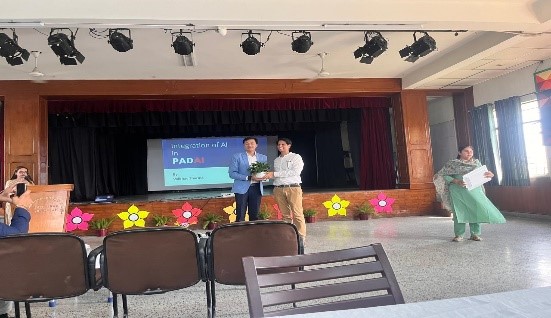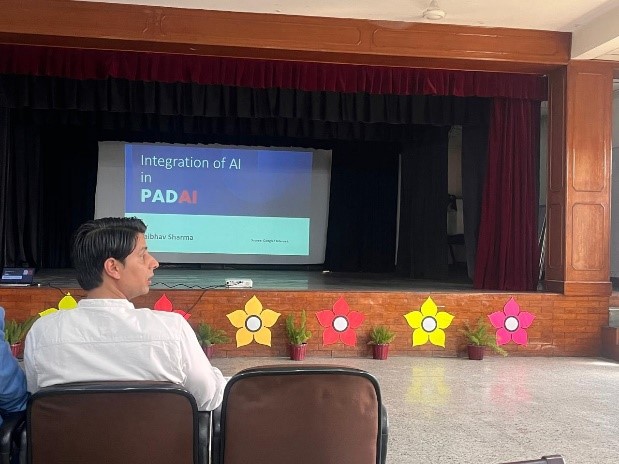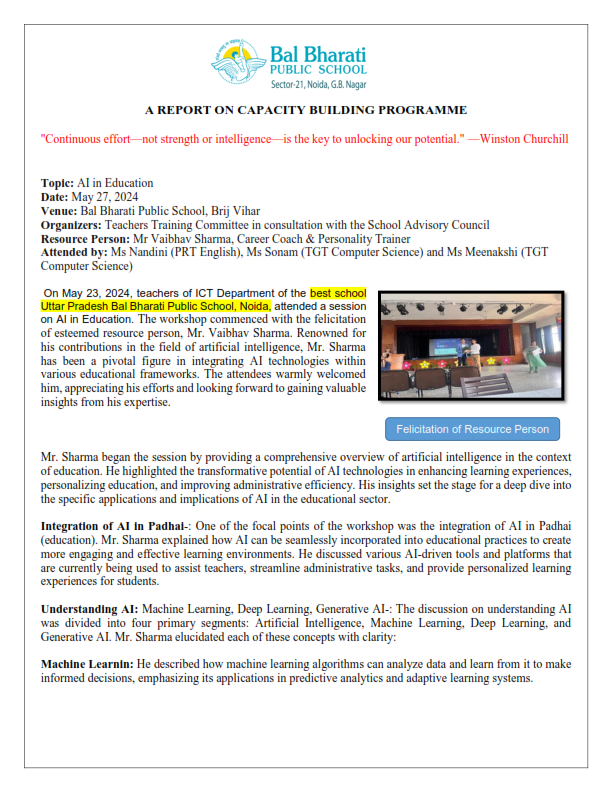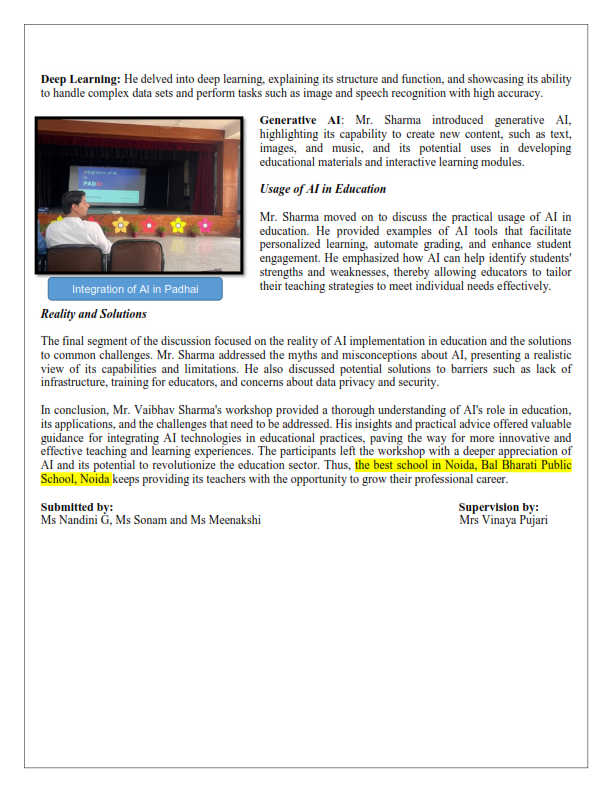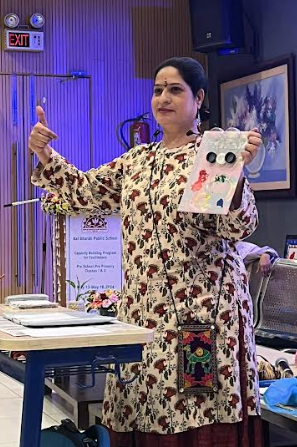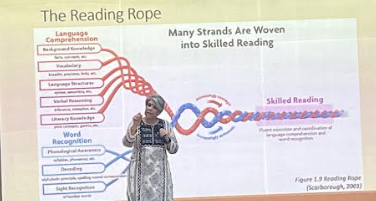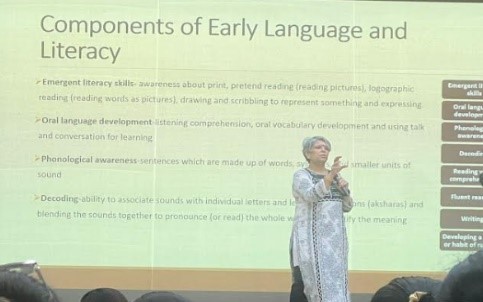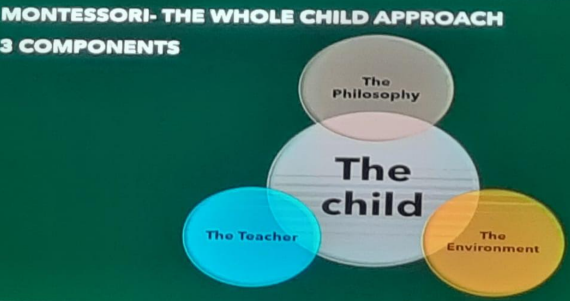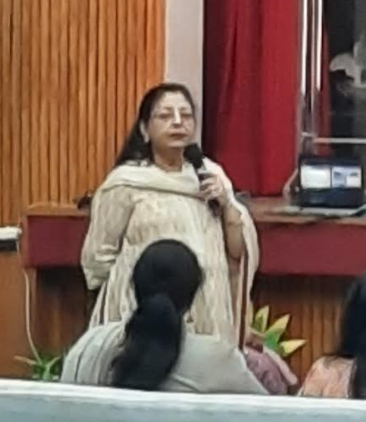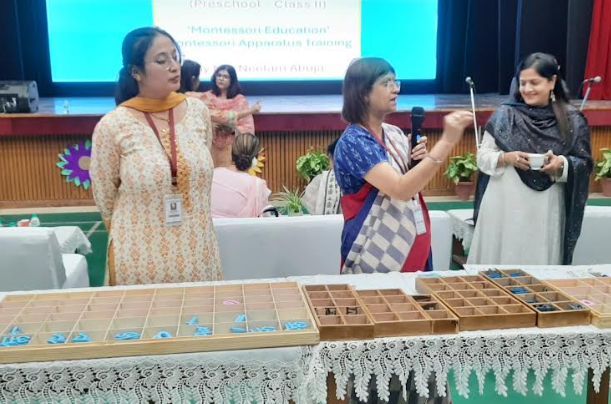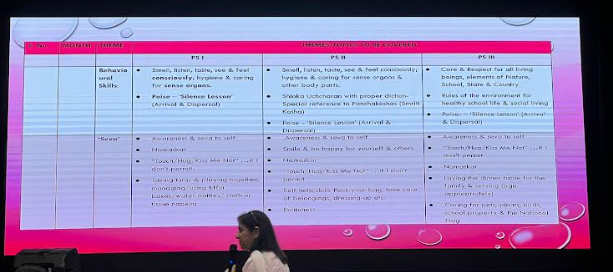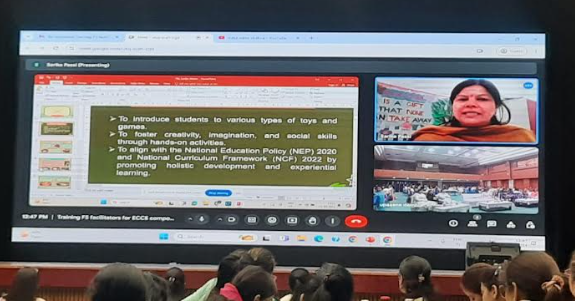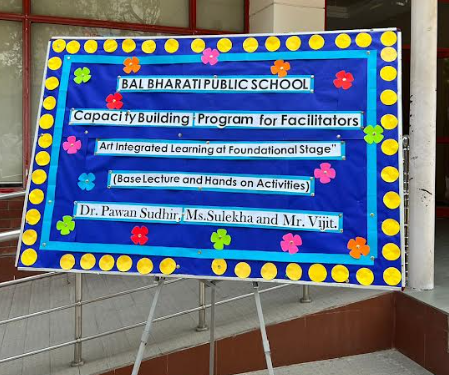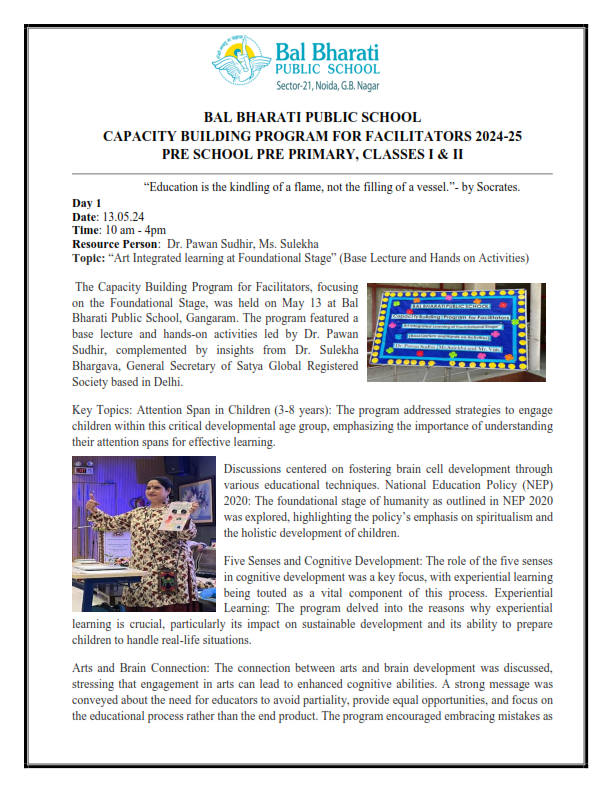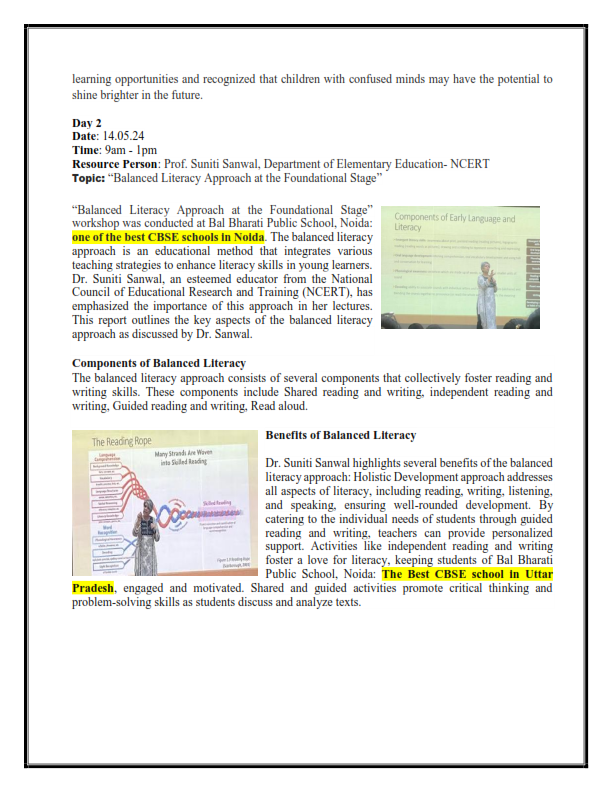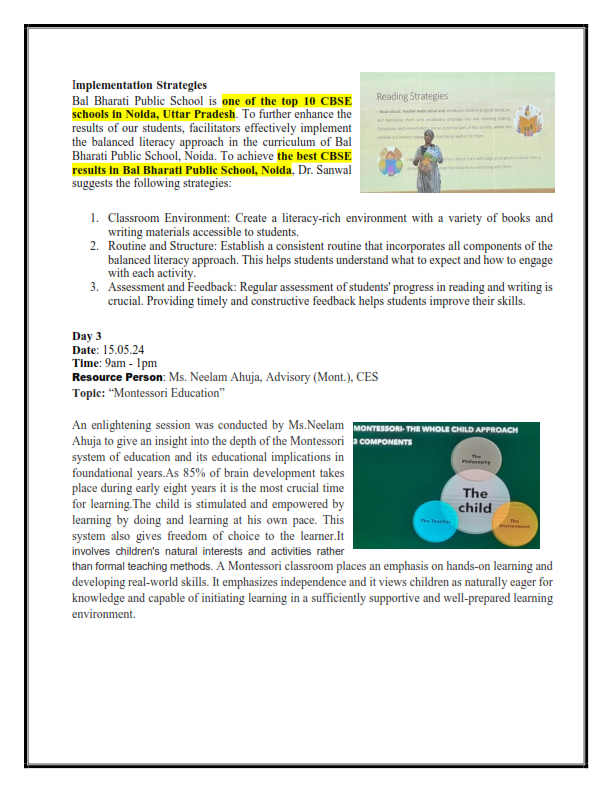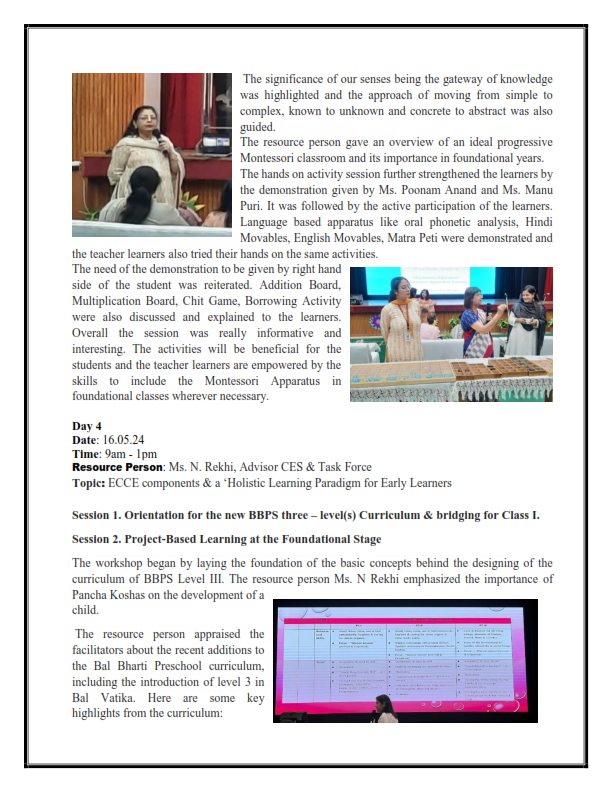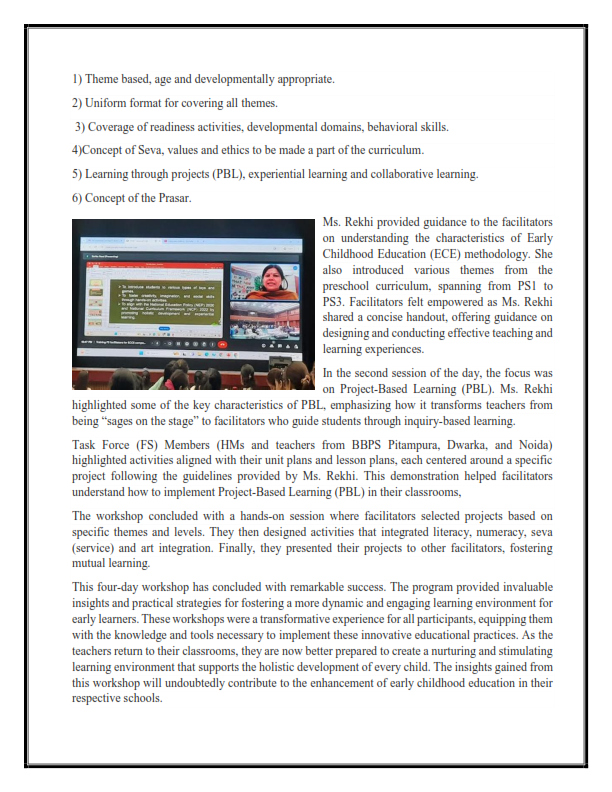A REPORT ON CAPACITY BUILDING PROGRAMME
"Continuous effort—not strength or intelligence—is the key to unlocking our potential." —Winston Churchill
Topic: AI in Education
Date: May 27, 2024
Venue: Bal Bharati Public School, Brij Vihar
Organizers: Teachers Training Committee in consultation with the School Advisory Council
Resource Person: Mr Vaibhav Sharma, Career Coach & Personality Trainer
Attended by: Ms Nandini (PRT English), Ms Sonam (TGT Computer Science) and Ms Meenakshi (TGT Computer Science)
On May 23, 2024, teachers of ICT Department of the best school Uttar Pradesh Bal Bharati Public School, Noida, attended a session on AI in Education. The workshop commenced with the felicitation of esteemed resource person, Mr. Vaibhav Sharma. Renowned for his contributions in the field of artificial intelligence, Mr. Sharma has been a pivotal figure in integrating AI technologies within various educational frameworks. The attendees warmly welcomed him, appreciating his efforts and looking forward to gaining valuable insights from his expertise.
Mr. Sharma began the session by providing a comprehensive overview of artificial intelligence in the context of education. He highlighted the transformative potential of AI technologies in enhancing learning experiences, personalizing education, and improving administrative efficiency. His insights set the stage for a deep dive into the specific applications and implications of AI in the educational sector.
Integration of AI in Padhai-: One of the focal points of the workshop was the integration of AI in Padhai (education). Mr. Sharma explained how AI can be seamlessly incorporated into educational practices to create more engaging and effective learning environments. He discussed various AI-driven tools and platforms that are currently being used to assist teachers, streamline administrative tasks, and provide personalized learning experiences for students.
Understanding AI: Machine Learning, Deep Learning, Generative AI-: The discussion on understanding AI was divided into four primary segments: Artificial Intelligence, Machine Learning, Deep Learning, and Generative AI. Mr. Sharma elucidated each of these concepts with clarity:
Machine Learnin: He described how machine learning algorithms can analyze data and learn from it to make informed decisions, emphasizing its applications in predictive analytics and adaptive learning systems.
Deep Learning: He delved into deep learning, explaining its structure and function, and showcasing its ability to handle complex data sets and perform tasks such as image and speech recognition with high accuracy.
Generative AI: Mr. Sharma introduced generative AI, highlighting its capability to create new content, such as text, images, and music, and its potential uses in developing educational materials and interactive learning modules.
Usage of AI in Education
Mr. Sharma moved on to discuss the practical usage of AI in education. He provided examples of AI tools that facilitate personalized learning, automate grading, and enhance student engagement. He emphasized how AI can help identify students' strengths and weaknesses, thereby allowing educators to tailor their teaching strategies to meet individual needs effectively.
Reality and Solutions
The final segment of the discussion focused on the reality of AI implementation in education and the solutions to common challenges. Mr. Sharma addressed the myths and misconceptions about AI, presenting a realistic view of its capabilities and limitations. He also discussed potential solutions to barriers such as lack of infrastructure, training for educators, and concerns about data privacy and security.
In conclusion, Mr. Vaibhav Sharma's workshop provided a thorough understanding of AI's role in education, its applications, and the challenges that need to be addressed. His insights and practical advice offered valuable guidance for integrating AI technologies in educational practices, paving the way for more innovative and effective teaching and learning experiences. The participants left the workshop with a deeper appreciation of AI and its potential to revolutionize the education sector. Thus, the best school in Noida, Bal Bharati Public School, Noida keeps providing its teachers with the opportunity to grow their professional career.
CAPACITY BUILDING PROGRAM FOR FACILITATORS 2024-25
PRE SCHOOL PRE PRIMARY, CLASSES I & II
“Education is the kindling of a flame, not the filling of a vessel.”- by Socrates.
Day 1
Date: 13.05.24
Time: 10 am - 4pm
Resource Person: Dr. Pawan Sudhir, Ms. Sulekha
Topic: “Art Integrated learning at Foundational Stage” (Base Lecture and Hands on Activities)
The Capacity Building Program for Facilitators, focusing on the Foundational Stage, was held on May 13 at Bal Bharati Public School, Gangaram. The program featured a base lecture and hands-on activities led by Dr. Pawan Sudhir, complemented by insights from Dr. Sulekha Bhargava, General Secretary of Satya Global Registered Society based in Delhi.
Key Topics: Attention Span in Children (3-8 years): The program addressed strategies to engage children within this critical developmental age group, emphasizing the importance of understanding their attention spans for effective learning.
Discussions centered on fostering brain cell development through various educational techniques. National Education Policy (NEP) 2020: The foundational stage of humanity as outlined in NEP 2020 was explored, highlighting the policy’s emphasis on spiritualism and the holistic development of children.
Five Senses and Cognitive Development: The role of the five senses in cognitive development was a key focus, with experiential learning being touted as a vital component of this process. Experiential Learning: The program delved into the reasons why experiential learning is crucial, particularly its impact on sustainable development and its ability to prepare children to handle real-life situations.
Arts and Brain Connection: The connection between arts and brain development was discussed, stressing that engagement in arts can lead to enhanced cognitive abilities. A strong message was conveyed about the need for educators to avoid partiality, provide equal opportunities, and focus on the educational process rather than the end product. The program encouraged embracing mistakes as learning opportunities and recognized that children with confused minds may have the potential to shine brighter in the future.
Day 2
Date: 14.05.24
Time: 9am - 1pm
Resource Person: Prof. Suniti Sanwal, Department of Elementary Education- NCERT
Topic: “Balanced Literacy Approach at the Foundational Stage”
“Balanced Literacy Approach at the Foundational Stage” workshop was conducted at Bal Bharati Public School, Noida: one of the best CBSE schools in Noida. The balanced literacy approach is an educational method that integrates various teaching strategies to enhance literacy skills in young learners. Dr. Suniti Sanwal, an esteemed educator from the National Council of Educational Research and Training (NCERT), has emphasized the importance of this approach in her lectures. This report outlines the key aspects of the balanced literacy approach as discussed by Dr. Sanwal.
Components of Balanced Literacy
The balanced literacy approach consists of several components that collectively foster reading and writing skills. These components include Shared reading and writing, independent reading and writing, Guided reading and writing, Read aloud.
Benefits of Balanced Literacy
Dr. Suniti Sanwal highlights several benefits of the balanced literacy approach: Holistic Development approach addresses all aspects of literacy, including reading, writing, listening, and speaking, ensuring well-rounded development. By catering to the individual needs of students through guided reading and writing, teachers can provide personalized support. Activities like independent reading and writing foster a love for literacy, keeping students of Bal Bharati Public School, Noida: The Best CBSE school in Uttar Pradesh, engaged and motivated. Shared and guided activities promote critical thinking and problem-solving skills as students discuss and analyze texts.
Implementation Strategies
Bal Bharati Public School is one of the top 10 CBSE schools in Noida, Uttar Pradesh. To further enhance the results of our students, facilitators effectively implement the balanced literacy approach in the curriculum of Bal Bharati Public School, Noida. To achieve the best CBSE results in Bal Bharati Public School, Noida, Dr. Sanwal suggests the following strategies:
Classroom Environment: Create a literacy-rich environment with a variety of books and writing materials accessible to students.
Routine and Structure: Establish a consistent routine that incorporates all components of the balanced literacy approach. This helps students understand what to expect and how to engage with each activity.
Assessment and Feedback: Regular assessment of students' progress in reading and writing is crucial. Providing timely and constructive feedback helps students improve their skills.
Day 3
Date: 15.05.24
Time: 9am - 1pm
Resource Person: Ms. Neelam Ahuja, Advisory (Mont.), CES
Topic: “Montessori Education”
An enlightening session was conducted by Ms.Neelam Ahuja to give an insight into the depth of the Montessori system of education and its educational implications in foundational years.As 85% of brain development takes place during early eight years it is the most crucial time for learning.The child is stimulated and empowered by learning by doing and learning at his own pace. This system also gives freedom of choice to the learner.It involves children's natural interests and activities rather than formal teaching methods. A Montessori classroom places an emphasis on hands-on learning and developing real-world skills. It emphasizes independence and it views children as naturally eager for knowledge and capable of initiating learning in a sufficiently supportive and well-prepared learning environment.
The significance of our senses being the gateway of knowledge was highlighted and the approach of moving from simple to complex, known to unknown and concrete to abstract was also guided.
The resource person gave an overview of an ideal progressive Montessori classroom and its importance in foundational years.
The hands on activity session further strengthened the learners by the demonstration given by Ms. Poonam Anand and Ms. Manu Puri. It was followed by the active participation of the learners. Language based apparatus like oral phonetic analysis, Hindi Movables, English Movables, Matra Peti were demonstrated and the teacher learners also tried their hands on the same activities.
The need of the demonstration to be given by right hand side of the student was reiterated. Addition Board, Multiplication Board, Chit Game, Borrowing Activity were also discussed and explained to the learners. Overall the session was really informative and interesting. The activities will be beneficial for the students and the teacher learners are empowered by the skills to include the Montessori Apparatus in foundational classes wherever necessary.
Day 4
Date: 16.05.24
Time: 9am - 1pm
Resource Person: Ms. N. Rekhi, Advisor CES & Task Force
Topic: ECCE components & a ‘Holistic Learning Paradigm for Early Learners
Session 1. Orientation for the new BBPS three – level(s) Curriculum & bridging for Class I.
Session 2. Project-Based Learning at the Foundational Stage
The workshop began by laying the foundation of the basic concepts behind the designing of the curriculum of BBPS Level III. The resource person Ms. N Rekhi emphasized the importance of Pancha Koshas on the development of a child.
The resource person appraised the facilitators about the recent additions to the Bal Bharti Preschool curriculum, including the introduction of level 3 in Bal Vatika. Here are some key highlights from the curriculum:
1) Theme based, age and developmentally appropriate.
2) Uniform format for covering all themes.
3) Coverage of readiness activities, developmental domains, behavioral skills.
4)Concept of Seva, values and ethics to be made a part of the curriculum.
5) Learning through projects (PBL), experiential learning and collaborative learning.
6) Concept of the Prasar.
Ms. Rekhi provided guidance to the facilitators on understanding the characteristics of Early Childhood Education (ECE) methodology. She also introduced various themes from the preschool curriculum, spanning from PS1 to PS3. Facilitators felt empowered as Ms. Rekhi shared a concise handout, offering guidance on designing and conducting effective teaching and learning experiences.
In the second session of the day, the focus was on Project-Based Learning (PBL). Ms. Rekhi highlighted some of the key characteristics of PBL, emphasizing how it transforms teachers from being “sages on the stage” to facilitators who guide students through inquiry-based learning.
Task Force (FS) Members (HMs and teachers from BBPS Pitampura, Dwarka, and Noida) highlighted activities aligned with their unit plans and lesson plans, each centered around a specific project following the guidelines provided by Ms. Rekhi. This demonstration helped facilitators understand how to implement Project-Based Learning (PBL) in their classrooms,
The workshop concluded with a hands-on session where facilitators selected projects based on specific themes and levels. They then designed activities that integrated literacy, numeracy, seva (service) and art integration. Finally, they presented their projects to other facilitators, fostering mutual learning.
This four-day workshop has concluded with remarkable success. The program provided invaluable insights and practical strategies for fostering a more dynamic and engaging learning environment for early learners. These workshops were a transformative experience for all participants, equipping them with the knowledge and tools necessary to implement these innovative educational practices. As the teachers return to their classrooms, they are now better prepared to create a nurturing and stimulating learning environment that supports the holistic development of every child. The insights gained from this workshop will undoubtedly contribute to the enhancement of early childhood education in their respective schools.

